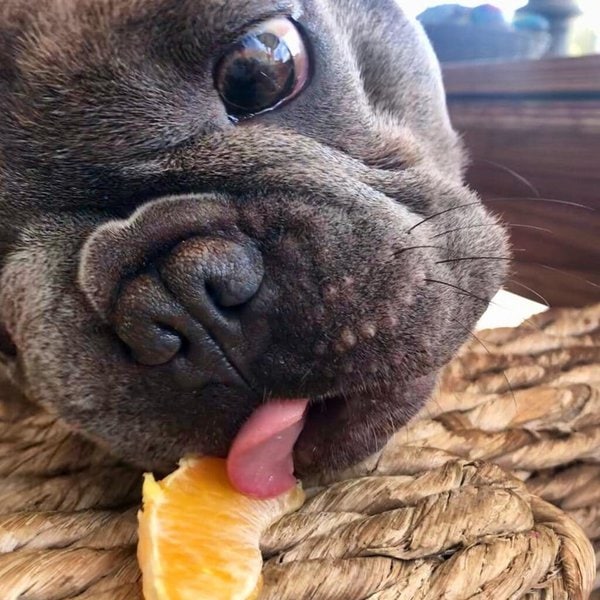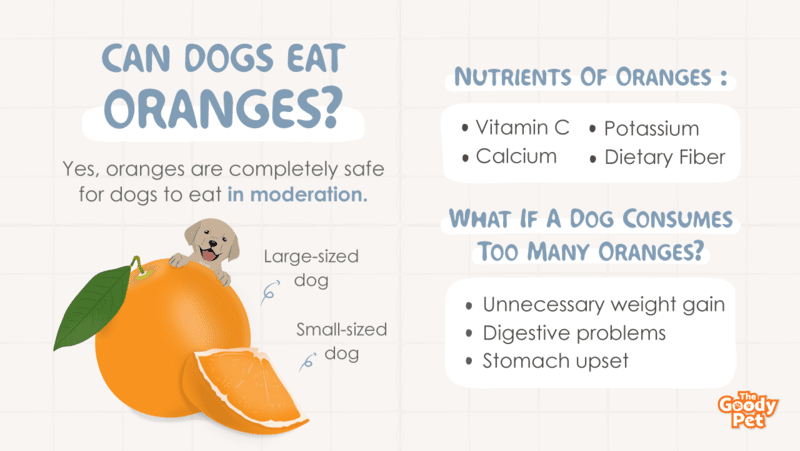My dog has been clingy since the last time I offered it some oranges. Whenever it sees me gulping down on an orange juice, my pooch would start getting excited. I know oranges are good for humans. But can dogs eat oranges too? What about cutie oranges?
Oranges are completely safe for dogs to eat. This also applies to cuties oranges. Both fruits carry a good source of vitamin C. But their overconsumption is thought to be detrimental to your dog’s health, leading to gastrointestinal issues and rapid weight gain.
One of the downsides of feeding your canine with too many oranges is that it can significantly raise blood sugar levels above the normal limit. To know more about the dangers of giving excessive oranges to your dog, we urge you to keep reading this article.
Before we discuss the dangers associated with the excessive consumption of oranges, let’s talk about how many oranges a pooch can take.
How Many Oranges Can A Dog Eat?

It depends on the size of the dog in question. A small-sized dog should not eat more than one-third of an orange. In contrast, a large-sized dog can take one full orange.
After giving your dog an orange, make sure to put your canine under watch for any abnormal side effects.
Dogs can have a wide variety of oranges ranging from tangerines to mandarins. If your dog has a sensitive stomach, you should only feed it oranges in moderation.
If your dog is diabetic, it is advisable not to give oranges to your canine. This would make its condition worse.
Do Dogs Like Oranges?
Most dogs enjoy taking oranges. These citrus fruits enjoy the combination of citric acid and the natural sugar found in oranges.
Oranges are rich in vitamin C and fiber, and also have a taste that most dogs like. Avoid giving orange peels to your dog. It causes intestinal blockage for them.
On the other hand, the majority of dogs dislike the strong acidic smell of oranges. Do not attempt to give your dog an unpeeled orange to eat.
The concentrated citrus smell of an orange is usually perceived by dogs when smelling the peel.
Can Dogs Eat Cuties Peel?
No. Never give your dog cuties peel to eat. The oil found in the peel and pith of cuties contains toxic chemicals that can harm your dog.
Before giving your dog any type of orange to take, always ensure you get rid of the peel and pith. The seeds should as well be removed since they contain cyanide.
The high citric acid found in cutie oranges can cause stomach upset for your canine. When you take many oranges, it is not uncommon to start racing to the restroom.
Apart from upsetting your dog’s stomach, the essential oils found in peels of oranges irritate the mouth and tongue of dogs.
What’s The Difference Between Cuties And Oranges?
Cuties are smaller and sweeter than oranges. They have thinner skin, and they are easier to peel, unlike oranges. Cuties are also less acidic.
The reason for the differences between these two fruits is not far-fetched. They are both different varieties of citrus fruits.
Clementines (also called cuties) are closely related to mandarin oranges, which are commonly called tangerines.
Cuties tend to be rounder in shape than traditional oranges. You can safely give both cuties and oranges to your dog in the right amount.
What Does Too Much Orange Do To Dogs?

If your dog consumes too many oranges, it causes stomach upsets and some other digestive problems.
Too many oranges are bad for your pooch. If you decide to give many oranges to your dog, it causes unnecessary weight gain for your doggie.
If you inadvertently feed orange peel or seeds to your canine, it can cause orange poisoning.
The fleshly parts of the orange do not cause orange poisoning, as it is mainly caused by its peel and seeds.
The following are the symptoms of orange poisoning in dogs:
If you notice any of the above symptoms in your dog, consider it an emergency. Take your dog to the nearest veterinary hospital.
How Many Oranges Can A Dog Eat Daily?
One or two slices of orange are okay for your canine in a day. The orange treats you give your dog should never be more than 10% of its whole daily calorie intake.
Daily orange consumption is not recommended for dogs. Veterinarians recommend giving dogs oranges at most every other day.
The acidic nature of oranges can upset your dog’s belly causing a lot of pain. If you’re giving your pooch an orange for the first time, give only a small piece no matter the size of your pooch.
Can My Dog Take Orange Juice?
No. Do not give orange juice to your pooch. The sugar content of oranges is way too high for dogs to digest. Regular intake of orange juice will cause your dog to be overweight.
Orange juice is not beneficial to your dog in any way. The risk of stomach upset is higher when you give orange juice to your dog.
Unlike fresh oranges, orange juice lacks dietary fiber. Even when it is freshly squeezed, you shouldn’t offer it to your dog.
The acidic content of orange juice can affect your canine’s tooth, eroding its enamel.
How Do I Give Oranges To My Dog?
Before giving oranges to your dog, get rid of the peel and remove every seed. Do not give the whole orange at once to your canine. Cut it into segments.
You can add orange slices to a mixed salad made of dog-friendly fruits such as apples, carrots, cucumber, and celery.
Orange peel and seeds are potential choking hazards for your pup. They can both cause intestinal obstruction for your canine. Get rid of them before giving an orange to your dog.
What Are The Benefits Of Oranges For My Dog?
Oranges are packed with nutrients such as vitamin C and potassium. They also have a low sodium content which makes them a healthy treat for your dog.
You may be surprised to know that oranges have more potassium than a banana! But the major nutrients found in oranges is vitamin C.
Oranges contain important nutrients found in a dog’s diet. These nutrients include:
- Thiamine
- Folate
- Antioxidants
The above nutrients are not found in equal amounts in oranges.
Vitamin C
This is a powerful antioxidant found in large amounts in oranges. Vitamin C strengthens the immune system of your dog by eliminating free radicals.
Furthermore, vitamin C helps your dog’s immune system by curtailing inflammation. It plays a crucial role in fighting off certain types of cancer.
Dogs are known to naturally synthesize vitamin C in their livers. Dogs with reduced liver function especially need vitamin C supplements.
Potassium
This vital mineral keeps your dog’s kidneys functioning properly. It also supports efficient heart function, muscle function, and a healthy digestive system.
If your pooch is deficient in this critical mineral, it will become highly lethargic. Your canine will also show a lack of appetite for food.
On the contrary, giving too many oranges to your canine can cause hyperkalemia. Watch out for symptoms such as diarrhea, vomiting, and gastrointestinal upset.

Dietary Fiber
The type of fiber found in oranges and other citrus fruits is soluble fiber. This type of fiber encourages the growth of beneficial gut bacteria.
Fiber has been shown to shorten intestinal transit rate in dogs with normal or slow transit time and to prolong transit rate in dogs with rapid transit time.
Calcium
In addition to being a delicious snack, sweet, juicy oranges contain a multitude of nutrients. Calcium is one vital mineral found in oranges.
In the right amount, calcium keeps the bones, organs, and muscles of your dog pretty strong.
Can I Give Oranges To My Dog Everyday?
Feeding your dog with oranges every day is not a great idea. Rather, feed your pup with a variety of fruits in moderation every day.
A wide variety of fruits are safe for dogs to eat; some are inherently toxic for them. Examples of fruits you should avoid giving your pup include grapes and raisins.
Always remember moderation is key when feeding oranges to your dog.





